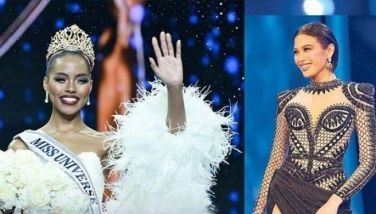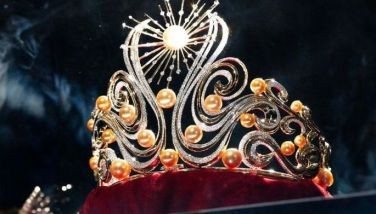The color and gender of God – in movies
June 1, 2003 | 12:00am
 The first time I saw God represented as a human being in a movie was in 1977. Watching Oh God! in Ali Mall was an "epiphany". It was a time when compact cellular phones were light years away, and Motown records dominated the airwaves. Eminem wasn’t even conceived then.
The first time I saw God represented as a human being in a movie was in 1977. Watching Oh God! in Ali Mall was an "epiphany". It was a time when compact cellular phones were light years away, and Motown records dominated the airwaves. Eminem wasn’t even conceived then.
In the movie Oh God!, the Supreme One was Caucasian, cigar-chomping, and bespectacled. George Burns’ portrayal of an approachable God rattled my earliest recollections of the Almighty’s movie appearance evincing His or Her power in the form of a pillar of fire, roaring voice, or gleaming sunset. The representation of God in Cecille de Mille’s The Ten Commandments dominated television screens during Holy Week, at least in the Philippines. Pardon the use of "His" or "Her" somewhere in this piece. They are concessions to political correctness. My Oxford-educated British mentor for seven years cautioned me repeatedly that this fear of being labelled politically incorrect dulls one’s thinking.
But what if God were a white female and a multi-cultural Being? I do not mean to be irreverent here but just for the sake of discussion, what will be your ideas and thoughts?
Take the case of God’s representation in the controversial movie Dogma. It has been characterized – assaulted would be a more appropriate word – as an affront to Christianity.
Dogma’s critics pointed to a mute representation of God by a singer with lots of moral baggage, including nude videos and sexually provocative songs about oral sex. Critics were referring to Ottawa-raised Alanis Morissette, whose parents were French-Canadian and Hungarian.
Back to a white male God featuring George Burns.
A lovable God played by Burns in Oh God! humanized this otherwise distant One, who possessed mysterious powers and who was somewhat a hazy object of a believer’s prayers, or the Force blamed for unleashing misfortunes or taking someone’s life.
Oh God!, an adaptation by Larry Gelbart of a novel by Avery Corman, featured singer John Denver as Jerry Landers, a grocery store assistant manager chosen by God (Burns) to evangelize and spread the Word to the world. Because of this unenviable task, it was not surprising that Jerry was branded as crazy. Even his wife, Bobbie (Teri Garr), doubted his sanity. Wouldn’t you?
Fortunately, there was a strong body of evidence in Jerry’s favor to convince a panel of priests that indeed he was a messenger of God. Oh God! earned $30 million on its first run. Producers tried to capitalize, but without success, on the original’s formula by filming two ho-hum sequels.
Oh God! was Denver’s bid at becoming an actor who found himself face to face with God. Despite a thorough upstaging by Burns, Denver had his time and manifested acting skills.
By the time you read this, hundreds of theater-goers would have seen on screen an ethnic-looking God in the person of Morgan Freeman in Tom Shadyac’s Bruce Almighty. If Burns had Denver, Freeman has the lanky Bruce Nolan (Jim Carrey).
Bruce Almighty’s depiction of an ethnic black God is a heavenly leap from Oh God!’s fair-skinned Omnipotent Being.
Bruce Almighty is a story of what happens when God temporarily transfers His omnipotence to a wacky human being while He goes on a much-deserved vacation. Black Morgan shares temporarily his stature as God to white Carrey, a bumbling television reporter in Buffallo. In a way, the film has white and black Gods simultaneously because of the power-sharing arrangement.
An interesting statement on the representation of God in Bruce Almighty said that the movie’s "fuzzy idea of God as a sly old Santa Claus who means well but can’t begin to answer all the prayers directed his way is a soothing pop confection intended to ruffle as few feathers as possible."
Freeman, in Bruce Almighty, has been described as bringing "his typical stately presence" and that he had played God like "a piece of cake."
There were those who think that "seeing him as God in Bruce Almighty is far preferable to the loose-cannon colonel he played earlier this year in the nightmarish Dreamcatcher." I agree.
Freeman, playing black God, had been touted as possibly "the most convincing screen sage" currently in Hollywood because of his aura of quiet authority and heavily cadenced drawl, signifying a fullness of wisdom.
While Sidney Poitier’s and Denzel Washington’s winning of the Oscar for leading roles may be interpreted as a march toward tearing down the social barriers between blacks and whites at least in Hollywood, the US film trade has stereotypically featured blacks in not so flattering light, the impact of independent film-makers notwithstanding.
While others might dismiss it nonchalantly, it should be viewed as unprecedented that Bruce Almighty had depicted God through a black male.
This brings me to the point that it is a sad commentary on the kind of so-called progress toward a truly multi-ethnic and genuinely diverse global community. Hollywood, and perhaps the media too, has not done much in exploring deeply the representation of marginalized sectors.
Hollywood films have not been effective in representing the intellectual and socio-cultural profile and magnificent contribution of marginalized sectors in building an inclusive but diverse global community.
Despite the clear fact that movie-going is a form of escapism, films give us ideas on who we are, where do we stand on issues, or how do we want to communicate our thoughts.
No matter how far-fetched, film-going could also be a form of seeking directions in these uncertain times. Perhaps, this was manifested fully when Bruce Almighty reigned at the box office in its opening weekend, raking in $86.4 million and toppling The Matrix Reloaded as the No. 1 movie last weekend. The Matrix sequel cornered $45.6 million, relegating it to a poor No. 2 on its second week of showing, based on estimates released May 26. The sequel was released May 14.
Bruce Almighty’s strong performance was a "definite surprise," according to Paul Dergarabedian, president of box-office tracker Exhibitor Relations Co.
As a final note, it will be deliverance to have movies that will represent a human God, preferably in various ethnicities, genders, and gender preferences; a God who will inspire us to examine our invariably shifting emotions and day-to-day problems; or a God who says Whatever! Also, we need movies with stories telling us how ordinary people lead godly lives amid great sacrifices and difficulties.
BrandSpace Articles
<
>
- Latest
- Trending
Trending
Latest
Trending
Latest
Recommended































